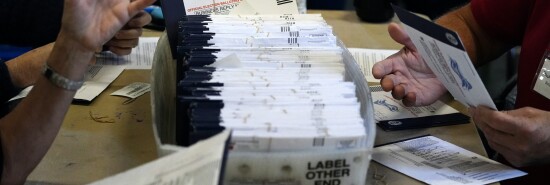
The Left’s latest crazy plan to keep Trump off the ballot
Washington Examiner
Video Embed
Whatever you think of Donald Trump, don’t fall for the suddenly fashionable but bogus claim that the Constitution’s Fourteenth Amendment has already disqualified the former president from returning to the White House.
Despite good-faith arguments by constitutional scholars and some not-so-good-faith scheming by Trump opponents, the theory fails the tests of logic, practicality, and democratic principles.
BIDEN’S WEAPONIZED DOJ ATTACKS SPACEX FOR HIRING AMERICANS
Proponents argue that the Fourteenth Amendment’s stipulation that nobody who has sworn an oath to defend the Constitution remains eligible for public office if he then “engage[s] in insurrection or rebellion against the same” applies to the former president. The prohibition is wise and important. The key issue, however, is controversy about how and when it becomes applicable.
Several respected constitutional scholars, including at least four often identified with the conservative Federalist Society, say the prohibition must be enforced, to quote the most comprehensive treatise, by “anybody who possesses legal authority (under relevant state or federal law) to decide whether somebody is eligible for office.” Emphasis on “anybody.” These scholars say this encompasses a whole host of “state election officials [and] other state executive or administrative officials,” which could include, at least initially, “state or local election boards, and state Secretaries of State.”
But what sort of behavior is definable as “insurrection or rebellion?” The theory that Trump is already disqualified because of how he disputed the 2020 election results and allegedly incited the 2021 Capitol riot asserts that the amendment language is “self-executing” and covers a “broad range of conduct.” The theorists essentially argue that even the most local of elections officials should make an initial determination of whether an office-seeker has transgressed in any of that “broad range” of conduct.
This is ludicrous. It would mean a Trump-hating election official in New Hampshire, for example, could unilaterally decide to keep Trump off the ballot in that state while a neutral official in New York could allow him to stand there. Lawsuits would erupt in every jurisdiction in the United States, with Trump seeking ballot access where it has been denied, while his opponents seek to expel him where he was deemed eligible.
Fortunately, Michael McConnell, the respected director of the Stanford University Constitutional Law Center and a former federal appeals court judge, produced a compelling takedown of the theory. He did so even though the theory was jump-started by an article written by two of his friends with whom he co-authored a casebook on the Constitution.
McConnell writes that he holds Trump in “low regard,” but, “We must not forget that we are talking about empowering partisan politicians such as state Secretaries of State to disqualify their political opponents from the ballot, depriving voters of the ability to elect candidates of their choice. If abused, this is profoundly undemocratic.”
When the Fourteenth Amendment clause at issue mentions “insurrection” and “rebellion,” McConnell writes, “These are demanding terms, connoting only the most serious of uprisings against the government.” The terms “should not be defined down to include mere riots or civil disturbances, which are common in United States history.” Instead, he writes, “We should seek the narrowest, most precise, least susceptible to abuse definition that is consistent with history and precedent.”
McConnell is also correct that the question of who and how to decide whether someone is guilty of insurrection should be obvious. It shouldn’t be up to random officials. It should work “through the ordinary course” of a jury trial and appeal “with due process at every step.”
CLICK HERE TO READ MORE FROM THE WASHINGTON EXAMINER
In other words, nobody should be able to keep Trump off the ballot for alleged insurrection unless a court has found him guilty of “rebellion or insurrection” or “seditious conspiracy,” which are federal crimes.
State or local election officials are not judges or juries. They have no business determining, without judges or jurors, whether anyone committed insurrection. Lacking such a court decision, they should have no discretionary power to deny voters the right to choose their candidate — no matter how distasteful that candidate may appear and how ill-advised the voters’ decision may be.
